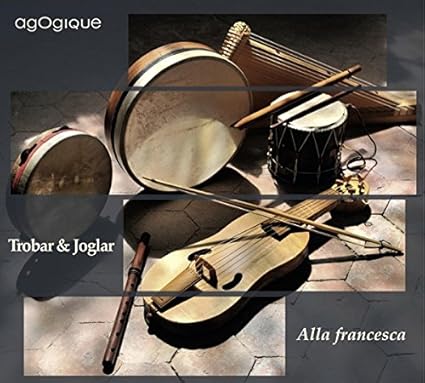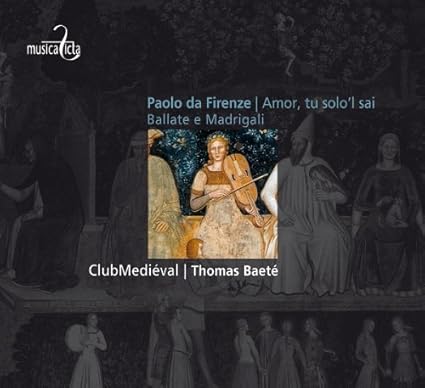Program: #14-43 Air Date: Oct 20, 2014
To listen to this show, you must first LOG IN. If you have already logged in, but you are still seeing this message, please SUBSCRIBE or UPGRADE your subscriber level today.
We’ll journey from the time of the troubadours with the latest from Alla Francesca to the 14th century in Italy.
NOTE: All of the releases on this program are from recent recordings of material from the 12th and early 15th centuries.
I. Trobar & Joglar (Alla francesca). Agogique CD AGO017.

The programme presented on this disc raises a fundamental issue concerning the historical transmission of the medieval lyric in Occitan and northern French: the essential role of the jongleurs alongside the troubadours and trouvères [poets]. Almost all the texts sung here are in the langue d'oc or Occitan, the language of the troubadours. These poets have a common language in the art they call 'trobar'. The theme of love is central: love betrayed, love that has gone cold, love so crazy that inspires one to sing nonsense lyrics and compose melodies to doomed love.
Here mingle sung and instrumental pieces and the texts belong to various genres and highlight different styles.
The term troubadour relates to the image of the jongleur, a word which derives from the Latin 'joculator[em]', the name coming from 'joc'[um], meaning play or sport. From antiquity a joculator was regarded as a person of ill repute and was criticised by the Church, which placed him in the same category as prostitutes. 'Trobar' was thus associated with 'joglar'. This is the 16th recording from Alla Francesca, founded in the 1990s as a chamber ensemble devoted to medieval music in all its diversity.
"the ensemble sounds as riveting as ever... The excellent instrumentalists play with equal commitment. Alla Francesca’s utterly convincing recreation of this music is full of magic, passion and humanity." BBC Music Magazine *****/*****
Bernart de Ventadorn: Con l'erbafresch' e.lhfolha par
Anonyme: Mira lege, miro modo
Raimon de Miraval: Per joi que d'amor m'avenha
Anonyme: Quan ai lo mon consirat
Jaufre Rudel: Quan lo rius de la fontana
Anonyme: Bona domna, tan vos ai fin coratge
Improvisation instrumentale sur les chansons - Tant es gaia
Raimbaut de Vaqueiras: Eras quan vei
Comtesse de Die: Ab joi et ab joven m'apais
Arnaut Daniel: Lo ferm voler qu'd cor m'intra
Anonyme: Adsit Johannis
Guilhem Augier Novella: Ses alegratge chant
II. Paolo da Firenze—Amor, to solo’l sai (Club Mediéval/Thomas Baeté). Musica Ficta CD MF 8017.

A large corpus of Paoloʼs music has survived for us through the ms. fonds italien 568 held in the Bibliothèque Nationale in Paris. Except for a Benedicamus and a Gaudeamus, all of his surviving works are polyphonic secular songs - madrigals and ballate - a corpus of around 60 pieces. Paolo is therefore among the Italian trecento composers who have left the largest surviving body of work - only Landini has left us more. But apart from the quantity, it is above all the exquisite quality of his music that we appreciate today.
Paoloʼs musical language is in tension between two poles: the eccentrically abstract and hypersensitive mannerism of late Gothic art, against the simple beauty and straightforward nature of the upcoming humanism of the Renaissance.
For us as contemporary performers Paoloʼs lyricism plays subtly with the balance between impression and expression, between serving and being served by the music.
Ballata: Amor, tu solo'l sai
Ballata: Lena virtù
Ballata: Un c'osa di veder
Madrigal: Girand'un bel falcon (instrumental)
Ballata (uncertain attribution): Altro che sospirar
Ballata (glossed Margit Übellacker): Poc'anno di mirar (instrumental)
Ballata: Sofrir m'estuet
Madrigal: Ventilla con tumulto
Madrigal: Non più infelice (instrumental)
Ballata (uncertain attribution): Perch'i' non seppi passar
Ballata: Perchè vendetta
Ballata: Ma', ria, ver di me pietà
Ballata: Amor mi stringe (instrumental)
Ballata: Lasso, grev'è'l partir
III. Il Codice di Guardiagrele (De bon parole/Marco Giacintucci). Tactus CD TC 400005.

The Codex of Guardiagrele contained several pieces composed by artists from the Abruzzo and from other regions which worked in Guardiagrele at the church of Santa Maria Maggiore. These compositions clearly show that the musical production of polyphonic works was rich in this region. As A. Ziino, G. Cattin and O. Mischiati explain: “The compositions of Guardiagrele are an evidence that fifty years earlier the polyphony was a common practice even in small towns of the Abruzzo; they were the first real document of the diffusion of polyphonic mensural music in the central – southern Italy”. The Codex is composed by several compositions of the early 1400 kept into mauscript of liturgic missals conserved until 1979 in Guardiagrele (in the province of Chieti). They are a gradual and an anthiphonary of three and four volumes respectively and a psalter, all written on a parchment arranged in folio of great dimensions. An ephigraph written on the salterio assigns a date at the manuscript: 1410 (“Incipit ordo Psalterii secundum ordinem sancte Romane Ecclesie pro ecclesia Sancte Marie de Guardia Grelis ad petitionem Simonis Cichi Jacobi Gentilis MCCCCX”).
1. Alleluya a 2 [4.21]
2. Rorate Caeli (plainchant) [2.07]
3. Sanctus 1 [3.45]
4. Kyrie (plainchant) [2.23]
5. Sanctus II [3.37]
6. Gloria (plainchant) [3.40]
7. Alleluya [3.19]
8. Sanctus III a 2 [1.46]
9. Patrem a 2 [7.44]
10. Sanctus a 3 [5.14]
11. Saltarello (based on Sanctus a 3) [2.14]
12. Sanctus a 2 [4.46]
13. Saltarello (based on the Sanctus a 2) [1.45]
14. Benedicta et venerabilis (plainchant) [4.04]
15. Agnus dei [3.54]
16. Agnus dei a 2 [4.22]
17. Questa fanciull’ Amor by Francesco LANDINI (1325-1397) [4.40]
(all tracks are Anon except 17)
Composer Info
Bernart de Ventadorn, Comtesse de Die, Guilhem Augier Novella, Arnaut Daniel, Paolo da Firenze, Jaufre Rudel, Raimon de Miraval, Bernart de Ventadorn, Francesco LANDINI,
CD Info
Agogique CD AGO017, Musica Ficta CD MF 8017, Tactus CD TC 400005,